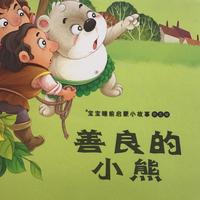善良 的 小熊
kind||the kind bear
bondoso||
Guter Bär
kind bear
Oso amable
Ours gentil
優しい熊
친절한 곰
Vriendelijke Beer
Kind Bear
Urso gentil
Snäll björn
善良 的 小熊
一天 清晨 , 老婆婆 在 门外 发现 了 一只 小熊 , 善良 的 她 收留 了 小熊 。
|early morning|old woman||outside the door||||a little bear||||took in||
||vovó||||||||||||
One morning, the old woman found a little bear outside the door. She was kind and took the little bear.
ある朝、おばあさんはドアの外で小さなクマを見つけ、親切に小さなクマを連れて行きました。
Certa manhã, uma velhinha encontrou um pequeno urso do lado de fora de sua casa e, sendo bondosa, acolheu o urso.
后来 村里 闹饥荒 , 有 村民 提议 把 熊 杀 了 吃 肉 。
|the village|famine|that|villager|suggested|||kill|||meat
||sofreu de fome|||||||||
Later, there was a famine in the village, and some villagers proposed to kill the bear for meat.
その後、村に飢饉が起こり、何人かの村人が熊を殺して肉にすることを提案しました。
Mais tarde, houve uma fome na aldeia e alguns aldeões sugeriram matar o urso para comer sua carne.
老婆婆 赶紧 放走 了 熊 , 熊 在 森林 里 找到 了 很多 食物 。
the old lady|hurriedly|let go|||||forest|||||food
||liberou||||||||||
The old woman quickly let the bear go, and the bear found a lot of food in the forest.
おばあさんがすぐにクマを放すと、クマは森の中でたくさんの食べ物を見つけました。
A velhinha rapidamente libertou o urso, que encontrou muita comida na floresta.
然而 过 了 两天 , 熊 又 回来 了 。
however|||||||
|||dois dias||novamente||
However, after two days, the bear came back.
No entanto, depois de dois dias, o urso voltou.
他 向 远方 指去 , 村民 们 会意 地 跟着 他 走 。
||the distance|pointed to|||understood||follow||
|||apontar|||entenderam||||
Er deutete in die Ferne, und die Dorfbewohner folgten ihm wissend.
He pointed into the distance, and the villagers followed him knowingly.
彼が遠くを指さすと、村人たちは故意に彼の後を追った。
Ele apontou para a distância, e os aldeões o seguiram entendendo.
爬 过 三座 雪山 , 他们 看见 一头 死 了 的 海豹 !
climbed||three|snow mountain||||dead||that|seal
|||montanha de neve||||morto|||foca
Als sie über drei schneebedeckte Berge kletterten, sahen sie eine tote Robbe!
Climbing over three snowy mountains, they saw a dead seal!
3つの雪山を登ると、死んだアザラシが見えました!
Depois de escalar três montanhas nevadas, eles viram uma foca morta!
村民 们 都 感谢 起 熊 来 。
villagers|||thank|that||to come
The villagers all thanked the bear.
村人たちはみんなクマに感謝しました。
Os moradores agradecem ao urso.
